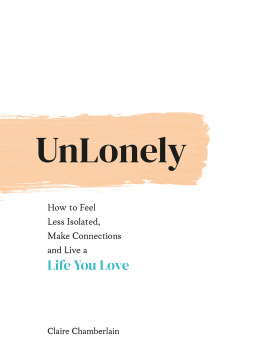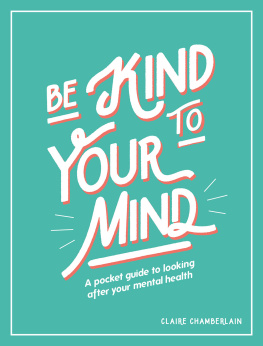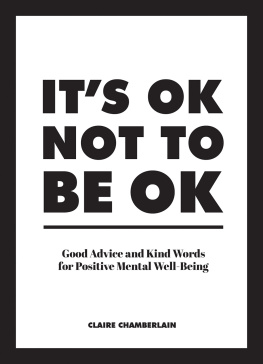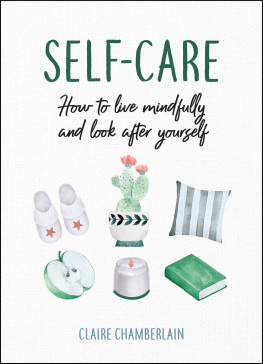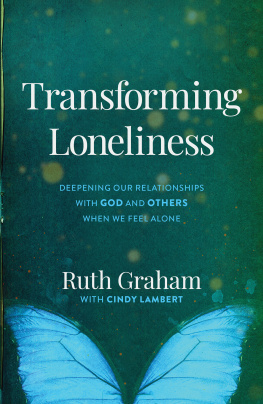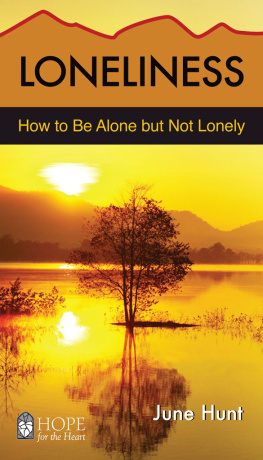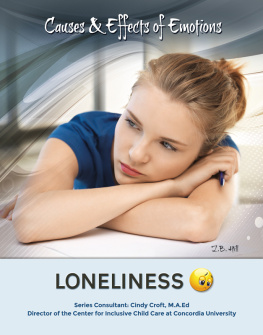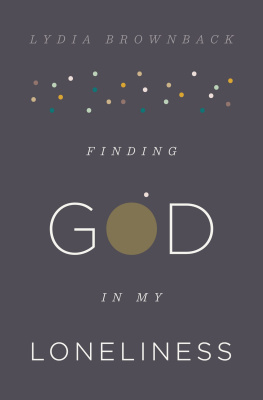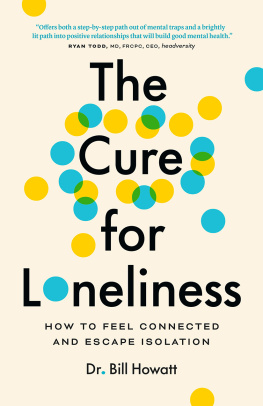UNLONELY
Copyright Summersdale Publishers Ltd, 2020
All rights reserved.
No part of this book may be reproduced by any means, nor transmitted, nor translated into a machine language, without the written permission of the publishers.
Claire Chamberlain has asserted her moral right to be identified as the author of this work in accordance with sections 77 and 78 of the Copyright, Designs and Patents Act 1988.
Condition of Sale
This book is sold subject to the condition that it shall not, by way of trade or otherwise, be lent, resold, hired out or otherwise circulated in any form of binding or cover other than that in which it is published and without a similar condition including this condition being imposed on the subsequent purchaser.
An Hachette UK Company
www.hachette.co.uk
Summersdale Publishers Ltd
Part of Octopus Publishing Group Limited
Carmelite House
50 Victoria Embankment
LONDON
EC4Y 0DZ
UK
www.summersdale.com
eISBN: 978-1-78783-783-6
Substantial discounts on bulk quantities of Summersdale books are available to corporations, professional associations and other organizations. For details contact general enquiries: telephone: +44 (0) 1243 771107 or email: .
Contents
INTRODUCTION
It's an unfortunate fact of life that everybody feels lonely sometimes. You may be able to take some comfort from knowing you're not the only one feeling this way. Loneliness can strike anybody and, contrary to popular belief, you may not even be alone when you experience these feelings of disconnection from others sometimes, a crowded room can feel like the loneliest place in the world. Loneliness can be deeply uncomfortable and distressing, but, if you can put some self-care measures in place, shift your perspective from one of loneliness to solitude and take some simple steps to connect with those around you on a deeper, more meaningful level, you can begin to find solace in the fact it will not last forever.
If you've found your way to this book because you're going through a difficult period for whatever reason, I hope that it offers you reassurance, support and practical inspiration, so you start feeling more confident about connecting with others and able to build a close, supportive network around yourself.
What a lovely surprise to finally discover how unlonely being alone can be.
Ellen Burstyn
What is loneliness?
Loneliness is not a pleasant feeling, and yet it's something we have undoubtedly all experienced from time to time. You can feel lonely in a variety of different situations, from being physically alone, to being surrounded by others and yet feeling like you don't really fit in. Whatever your experience, you will likely identify with the fact that lacking close human interaction can leave you feeling disconnected somehow. And it's this disconnection that can make you feel isolated, unhappy and lonely.
LONELINESS IS A PERCEPTION
Of course, not everyone who spends a lot of time alone is lonely. Loneliness is a perception, based on your own personal beliefs, desires and social needs. You might spend a large proportion of your day in solitude and yet feel perfectly secure, fulfilled and content. For some, the peace and quiet of being alone might be a joy, providing them with the silence needed to think and the space to throw themselves into creative projects. If this is the case, then loneliness will simply not be part of the equation. However, if your circumstances mean you spend large portions of your life alone and you actually crave human connection, then loneliness is likely to play an important part in your experience. The degree to which you experience loneliness is entirely personal and will be unique for everyone.
LONELINESS AND EVOLUTION
Collectively as a species, we have evolved to seek out close human interaction. This makes sense when you think about it in days gone by, we had to stick together in order to ensure our survival, living in tribes, working as a team by taking on specific roles within our societies, and sharing our stories and experiences with others. This need for connection is therefore hardwired into our DNA. We need to form close bonds with others in order to feel secure, for when we feel understood and as though we belong as part of a group, we feel safe. Conversely, feeling as if we are on the edge of society that we don't belong leaves us uneasy, unsettled and, primarily, unhappy. All of which can be explained from an evolutionary point of view, too if we live on the periphery of society, our survival suddenly becomes uncertain, as we lack protection.
People are never too young or too old to look for human connection.
John Turturro
You're not the only one
As much as it can feel like you're entirely alone and that no one understands how you feel, every person on the planet has experienced loneliness at some point in their lives. No one feels like they fit in all the time and no matter how confident others may outwardly appear, everyone knows what it feels like to be "the outsider".
NOT ALONE, BUT LONELY
Often when we picture loneliness, we imagine being physically all on our own. However, it's perfectly possible to be surrounded by other people and yet still feel lonely. For example, you could be at home by yourself, curled up on the sofa with a cup of hot tea and a good book, and feel perfectly happy and at ease. On the other hand, you might be at a party surrounded by a large group of acquaintances and yet feel utterly alone. Often, it comes down to how much we feel understood and accepted by those around us, and how connected we feel on a level that's deeper than "small talk". If we don't have a true connection with a person or group of people, or if our confidence is low at that moment, meaning we're not in the best place to form new relationships, it's perfectly possible to feel alone in a crowd. It's natural to be unsettled by this and allow the loneliness to feed feelings of low self-worth, but remember, this situation does not dictate who you are: it's just one moment.

